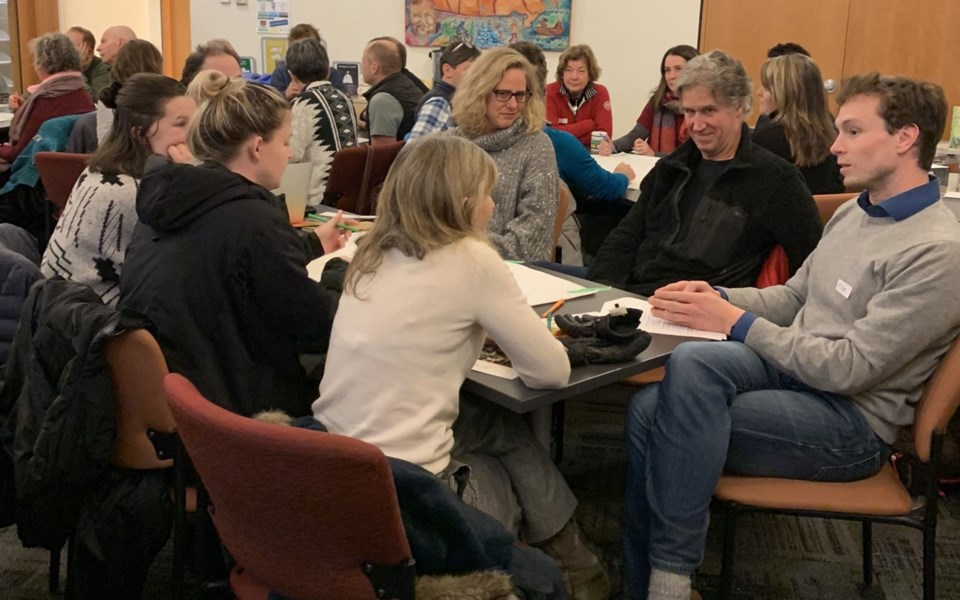Living in a ski town that both relies on and greatly impacts its surrounding environment, most Whistlerites care deeply about the effects of climate change. And there's no question that sentiment has only grown stronger as the crisis has worsened and the discussion around our changing climate has intensified in wider society.
Dozens of residents crammed into the Community Room at the Whistler Public Library on Thursday, Jan. 16 to discuss what's being done locally and how they can contribute personally.
The climate conversation was guided by seven local panellists invited by the Whistler Community Foundation (formerly the Community Foundation of Whistler) as part of its Vital Café series, which aims to spur discussion on a variety of topics prevalent in the resort.
Asked by moderator Libby McKeever to discuss how the climate crisis has impacted Whistler and its economy, councillor and longtime Whistler Blackcomb (WB) environmental guru Arthur De Jong spoke to the adaptability Whistler has as a four-seasons resort.
"We have deep resilience but the global economy doesn't," he said. "If we go up two, three degrees, the stretch on global resources will put us in a place where we won't have a housing crisis here because geopolitically we won't have relevance.
"We need to punch well above our weight [in Whistler], and we have and we're pushing it again."
Pointing to WB weather data dating to 1978, De Jong said that Whistler has consistently seen more snow each decade, and the average winter temperature has increased by 0.5 degrees Celsius in that time. By comparison, summer temperatures have risen by about 2 C.
"In science, in such a short window, that is profound," he said, noting the increased risk of wildfire and drought.
"What's my biggest concern here? It's not winter," he added. "The most sustainable thing we can do is not burn this place down in the summer."
Touching on the efforts being made at the local level, Max Kniewasser, the municipality's climate change coordinator highlighted the expansion of transit, the RMOW's home-energy assessment program, and its overarching climate plan as a few of the significant initiatives.
He was also asked how the community has done to meet its 2020 target of reducing GHG emissions by 30 per cent below 2007 levels.
"In short, not that great," he replied, adding that the community has reduced emissions by just five per cent. "We essentially have no chance to achieve our targets, but we're in good company in the sense that almost every resort community has also fallen short."
Asked what the average resident can do to reverse this trend, Kniewasser was clear.
"Transport choices," he said. "The answer is quite simple, really: Take a bike, take transit, carpool, try to avoid taking transport when you can ... Choose a smaller vehicle or a hybrid or an electric vehicle."
Former Councillor and waste management specialist Sue Maxwell offered her own suggestions for how the everyday citizen can make a difference: make more conscious decisions about the products you buy and how long you keep them.
"If we look at reduction, I don't need eight pairs of skis ... Maybe I don't need a special tree-trimming tool that I can rent from Sabre or borrow it from a friend," she said, discussing the invisible impact of a wide number of products that come with transport, packaging and other ancillary energy uses that are rarely tracked in full.
"[We need to] reduce the amount of stuff we're consuming. That will reduce our GHG emissions. It's not going to show up in our municipal tracking at this time ... but I think in time we will start to see an accounting of the 'little backpack' that comes with the products we use."
Also on the panel was 19-year-old Whistler Secondary School grad and Protect Our Winters member Irie Smith, who was asked how she's seen the community "wake up" to the threat of climate change. "The two biggest things I've seen a change in ... is in education and a turn in youth, especially," she said. "Pushing that on, believing in compost and recycling, youth have a way of pushing their passions and ideas to other people.
"Another thing in youth is there is this blind faith and hope—which is what we need. The passion to change the unchangeable ... Sticking to what you believe in, even if it is much more expensive or difficult."




